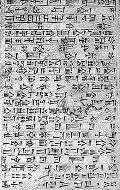|
Film Tells Ancient Poor Man's Tale in Dead Language
November 29, 2018
A new film tells an ancient story in a dead language. The story dates to Mesopotamian times. The language is Babylonian, which hasn't been spoken in 2,000 years. A University of Cambridge professor, Dr. Martin Worthington of St. John's College, led a team of researchers in recreating the words used in the 20-minute film, The Poor Man of Nippur. In the story, a city mayor kills the prized possession, a goat, of a pauper named Gimil-Ninurta. In return, the poor man exacts his revenge in the form of three separate beatings. Although the action is sometimes violent, the story is told in a humorous way, including the use puns; many descriptions of the text describe it as satire. The story as written dates to 701 B.C. as 160 lines of text on a clay tablet found in Sultantepe, in what is now southeastern Turkey. Unlike other famous stories of the Babylonian culture (such as the Epic of Gilgamesh), this story focuses on a poor man. He is the only person named in the story. Nippur was a city in the northern region of the area known as Babylonia that contained a shrine to one of ancient Sumeria's most important gods. The location was in what is now Iraq. When the story was inscribed into the tablet, the Assyrian king Sennacherib was on the Babylonian throne. This was not long before the rule of Ashurbanipal, in whose famous Library was found another clay tablet containing a fragment of The Poor Man of Nippur. Many historians think that the story is much older than that. All actors in the film were members of the Cambridge Assyriological community. Film locations were in and around Cambridge and also included the British Museum, and an archaeological park. The film was screened at at a Cambridge lecture hall in February 2018 and made available on the Internet in November 2018. |
Social Studies for Kids |
Social Studies for Kids
copyright 2002–2019
David White





